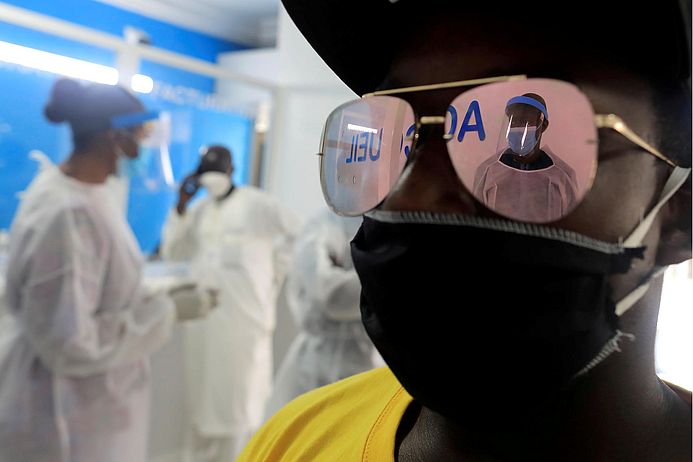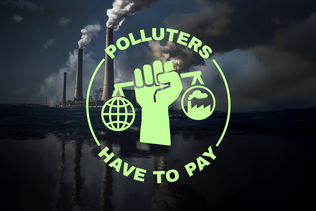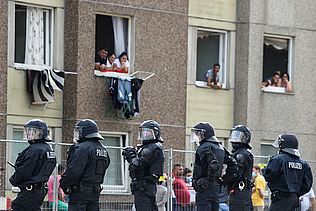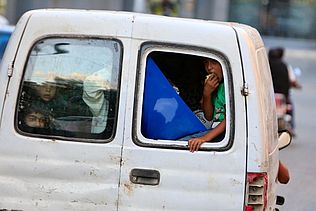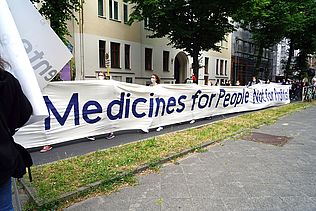The Russian government is playing at full risk. The first nationally approved vaccine Sputnik 5 against the Corona virus has immediately attracted heavy international criticism as the Russian researchers have not published transparent data and the relevant phase 3 trials have only just begun. Nobody knows whether this "Sputnik moment" for Putin will not turn into a "Challenger Disaster" if the vaccine turns out to be less effective or even worse with too many side effects. Nevertheless, at the same time, countries are already queuing up to test and use the vaccine, and the Philippine President Duterte wants to be the first to test it personally. If it works for him, it will be good for the whole country. He too is counting on a national solution.
This “Vaccine Nationalism” is a counterpoint to the short spring of solidarity, when on May 4th the WHO and the European Commission called with great fanfare for joint global fundraising to fight the coronavirus. The current level of funds raised so far is an impressive €15.9 billion, almost half of which has been raised by „Team Europe“, the European Commission, EU Member States and the European Investment Bank. The event is also remembered because it was there that the coronavirus vaccine was named a "Global Public Good" for the first time by head of states, by Emmanuel Macron, by Angela Merkel. And Commission President Ursula von der Leyen stressed that "governments and global health organisations are pulling together in the fight against the coronavirus".
Solidarity seemed to be a priority. A few days earlier, the World Health Organisation had presented its "Access to COVID-19 Tools (ACT) Accelerators", an ambitious structure with the most important global health partnerships, which was to accelerate and coordinate the development, procurement and distribution of vaccines, drugs and diagnostics. These activities should also prevent a repetition of the H1N1 influenza pandemic experience in 2009, when solvent countries put up a race for the vaccine, leaving poorer countries with only a few "humanitarian scraps" to be distributed by the WHO.
Who is closest to himself
But early on, the US government left this global alliance, and made a publicity stunt launching „Operation Warp Speed“ at the beginning of April, a competing 10 billion US dollars vaccine programme for the domestic pharmaceutical companies, which intends to develop and produce hundreds of millions of vaccine doses by January 2021 - initially for its own national needs, of course. Furthermore, the Indian, Chinese or Russian governments have not joined the Accelerator Initiative so far, even though the Indian vaccine manufacturers are the most important vaccine producers for the Global South and Russian and Chinese research teams promise an early success of their own vaccine developments.
Months have passed since then and with every promising announcement of a vaccine candidate, the façade of global solidarity continues to crumble. For it is increasingly clear that production capacities for a "global vaccine" are limited and will be in the near future. The "Inclusive Vaccine Alliance of Germany, France, Italy and the Netherlands" started its own negotiations with pharmaceutical companies for purchase guarantees, thus securing delivery quantities for successful vaccine candidates. The EU Commission took over these negotiations with Sanofi-GSK and signed a first deal with them and also with the competing company AstraZeneca in August 2020.
Von der Leyen and other politicians like to talk about "that nobody is safe until everybody is safe", but when it comes to getting out of the social and economic crisis as quickly as possible, then one's own citizens are still a little closer than the world community.
Thus, the COVAX Facility, the vaccine pillar of the Accelerator Initiative, which is organized by WHO together with the Global Alliance for Vaccines and Immunisation (GAVI) and the Coalition for Epidemic Preparedness Innovations (CEPI), has so far achieved little in the way of results for its model of a global "purchasing and distribution community" for effective Covid19 vaccines. With a portfolio of currently 9 vaccine candidates from different vaccine classes (DNA/mRNA; viral vectors, proteins) and different researcher / manufacturers in the USD, Europe, China and Australia, the plan is to be able to offer greater security and also more favorable prices for a promising product in development than individual bilateral negotiations country by country with manufacturers can offer.
And even more important, as a sign of global solidarity, this COVAX facility will additionally support the least financially strong countries in their procurement with funds from global and national development budgets. So far, however, no watertight commitments have been made. After months of hesitations, at least 64 high and middle income countries joined the initiative, including 29 European Countries in the “Team Europe”. However, not only the US, but also Russia, China, India and Brazil as important vaccine producing countries are still absent.
Priority supply
In the COVAX Facility, too, not all countries would be equal: the distribution plan initially sees for the simultaneous provision of supplies primarily to health, nursing and other crucial professionals in all participating countries (estimated at approx. 3% of the respective populations). Subsequently, 20% of the population (high risk groups such as the elderly and chronically ill) are to be supplied in further tranches, and here the "self-payers" are already promised priority supply, while the countries dependent on aid funds must wait until corresponding quantities can be produced and paid for. And then correspondingly wait even longer until the availability of nationwide vaccination programmes.
And it is also unclear whether GAVI actually has the authority and skills to negotiate successfully with the pharmaceutical companies to bring prices close to production costs, not to speak to negotiate on behalf of OECD countries. There has been and still is much criticism of the fact that the manufacturers have a seat on the GAVI board and that in the price and supply negotiations for the pneumococcal vaccines, which are a flagship project of GAVI, the producers make enormous profits and even years after the introduction of the vaccines there is no real price competition between the few manufacturers but rather an oligopoly structure that guaranties such profits.
Selfishness also harms the rich countries
But even for this "solidarity light" model of the COVAX Facility, six months after the start of the pandemic, there is insufficient global support. Rather, competition and mutual accusations are intensifying. The US and British governments are complaining about Russian and Chinese vaccine data theft, which the accused governments of course immediately reject. As convenient as it is for the European states in particular to point the finger at the US president, who wants to push through his "America first" without scruples, they obviously do not want to be reminded of their own self-declared obligations.
At the same time, the selfish impulses in the fight against each other and not with each other for the best strategy to defeat the Covid19 pandemic could hamper the longer-term strategy also for the technologically advanced nations. This is because the production and supply chains are globalized, including for vaccine production, and even the USA is dependent on such secure trade and supply contracts. And even if the USA could protect itself and become self-reliant on vaccines, it would still remain dependent on the world as sales markets and suppliers, and would suffer from a prolonged economic recession as a result of the pandemic outside its "Island of the Blessed". The isolationist option that Donald Trump and his team of advisors are playing with is as illusory as his trade war with China.
And finally, there will most likely not be the one 100% effective vaccine, the "silver bullet", as the WHO Director General Dr. Tedros reiterated in early August. For this reason, too, it would be in the "enlightened self-interest" of all players to make consistent use of the options for cooperation. The fact that the German government is not involved in either the COVAX initiative or the Covid19 Technology Patent Pool for the global benefit of health knowledge shows how questionable the self-appointed role as "global health champion" is.
First published on 23 of September 2020.
Translation by Mamisoa Rajosvah.
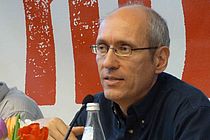
Andreas Wulf
Dr. Andreas Wulf is a physician and has been working with medico international since 1998. He is the Berlin representative of the organisation medico and works on global health issues.

